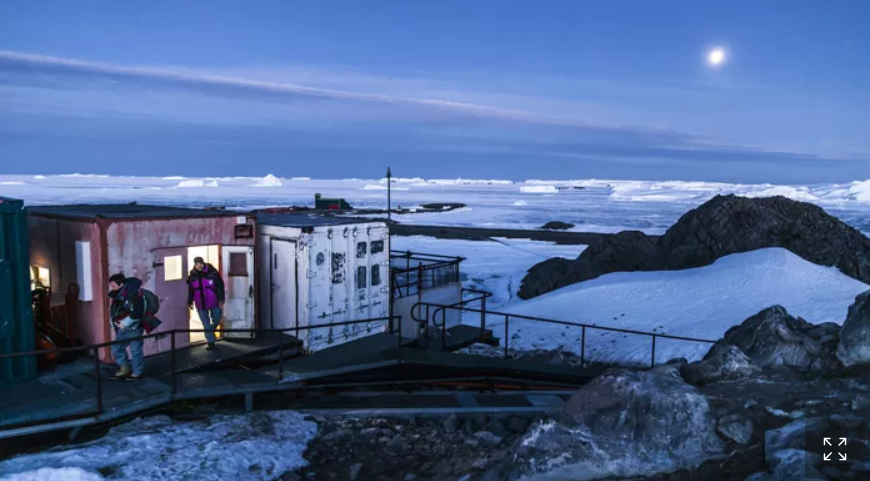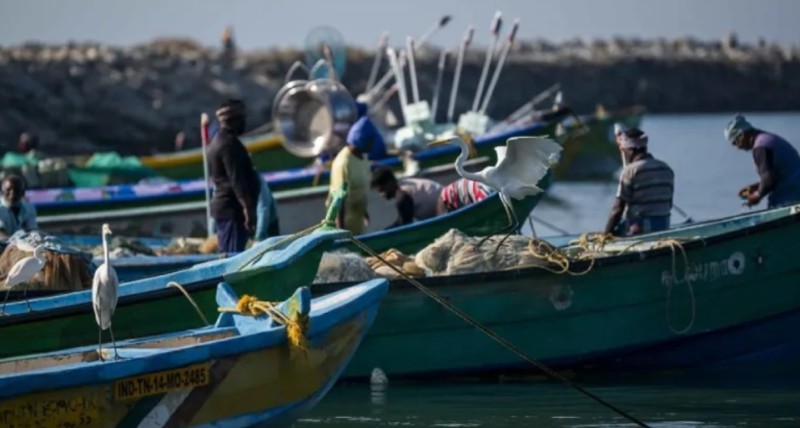The Franco-Italian Concordia Station, located in a region known as « Dome C, » is a cutting-edge site for global climate research, with France having played a pioneering role for several decades.
« The IPEV is in danger, » announced Olivier Poivre d’Arvor, ambassador for the poles and maritime issues, on April 2, during a colloquium at the French National Assembly, organized by deputies Clémence Guetté and Jimmy Pahun, co-chairs of the Arctic, Antarctic, TAAF (French Southern and Antarctic Lands), and Deep Ocean study group. IPEV stands for the Paul-Émile-Victor Polar Institute, created in 1992, which employs about fifty people and handles the logistics to maintain French scientific bases in the Arctic and Antarctica.
Normally, its operating budget is already tight, and more than 100 million euros would be required to restore the Dumont d’Urville Station, located on the coast of Terre Adélie, which serves as a logistical base for the Franco-Italian Concordia Station, over a thousand kilometers inland on the frozen continent. Despite promises made by Emmanuel Macron at the end of 2023, funding is trickling in slowly to keep the IPEV afloat, and in the current climate of budgetary scarcity, it is feared that these funds may dry up.
Concordia, located in the « Dome C » region, is a top-tier site for global climate research, where France has taken a pioneering role for decades. It is here that ice cores have been retrieved to reconstruct the Earth’s climate over the past million years. Air bubbles trapped in the ice help correlate the concentration of carbon dioxide in the atmosphere with temperature. The last segments of ice, cooled in special freezers to -50°C, are « on their way » to France, with their secrets set to be revealed « in a few years, » explained Amaëlle Landais, research director at LSCE (Laboratory of Climate and Environmental Sciences).
A major site
The declaration by the ambassador of the poles was a shock to the approximately 200 attendees, including many scientists, present at the French National Assembly on April 2. « We were all very surprised, » confirmed Valérie Masson-Delmotte, a paleoclimatologist at the CEA, who is conducting research on the water cycle in Antarctica with the support of the Polar Institute. « Last year, the project was to merge the IPEV with a larger institute, Ifremer. But the file was put away in a drawer, » said a glaciologist. Another solution is currently being considered, which would involve merging IPEV with the technical services of CNRS.
These delays jeopardize French polar research. Biologist Yan Ropert-Coudert, the director of IPEV, has, according to our information, just resigned. « For personal reasons, over a month ago, » confirmed sources at CNRS. Was it just a coincidence in timing? A sign of powerlessness? Contacted, the scientist did not respond to our inquiries. His predecessor, Jérôme Chappellaz, had quit in 2022, lamenting the lack of government funding for polar research.
Olivier Poivre d’Arvor had successfully convinced Emmanuel Macron to fund this project. In November 2022, he proposed a new French polar strategy, with 120 million euros earmarked to modernize the aging Dumont d’Urville Station, where a new docking quay was to be built. Convinced, Emmanuel Macron announced in November 2023, at the One Polar Summit, a funding project of 1 billion euros. However, the promises are slow to materialize. Admittedly, small amounts of funding have been unlocked for IPEV, but « the money is being used to cover deficits, » said Jimmy Pahun, a member of the National Assembly from Morbihan. Emergency budget increases had been granted by the previous government, particularly to buy fuel to power the station!
Dumont d’Urville is a major site for French research, hosting more than twenty people during the winter and up to a hundred during the austral summer. « The station, which opened in 1956, is a true scientific campus with about fifty facilities, » states a report on the polar strategy by Olivier Poivre d’Arvor. « It is of major importance for studying the atmosphere, the ice cap, geophysical phenomena, and animal populations, with over 70 years of data collected annually, for example, on the emperor penguin, » notes a scientific report.
Interministerial meeting
Yannick Fagon, head of the project to rebuild the Dumont d’Urville Station, which no longer meets environmental standards, announced that the roadmap has been delayed by a year. It will be completed, at best, by the end of 2026. He estimates that it will take « forty years to modernize the aging station, » far from the initial ten-year project. Construction is very costly, as « 25% to 55% of the total cost is related to transporting materials. » « For the previous station, everything, absolutely everything, was built by the teams in the region and transported from Hobart (in Tasmania, Australia), 2,700 kilometers away. »
« But with each change of government, the study on IPEV seems to start from scratch, » laments glaciologist Gaël Durand, who insists that the scientific community urgently needs a « polar operator, a critical logistics agency to access the white continent and enable research. »
To ensure the survival of IPEV and secure the necessary funding, Olivier Poivre d’Arvor proposes that an interministerial meeting be held between the Ministry of Research and the Ministries of Environment, Defense, Foreign Affairs, and the Prime Minister’s office. Because beyond fundamental research questions, the issues are also geopolitical, economic, diplomatic, and military. China and the United States have already strengthened their presence in Antarctica. Norway wants to invest 180 million euros to accommodate 100 people in its Troll Station. The UK has allocated 140 million euros for its new Discovery building, and « India wants to permanently host 140 people, » adds Yannick Fagon.
After tensions over the past two years, particularly with China and Russia, who oppose the creation of new marine protected areas at the edge of the white continent, there are fears of a possible U.S. withdrawal from the Madrid Protocol. This text had sanctified Antarctica as a « natural reserve devoted to peace and science » until 2048. In the current context of tensions, « there is a need to build international scientific cooperation, somewhat in the model of what glaciologist Claude Lorius had built with Americans and Soviets in his time, » hopes Valérie Masson-Delmotte.



